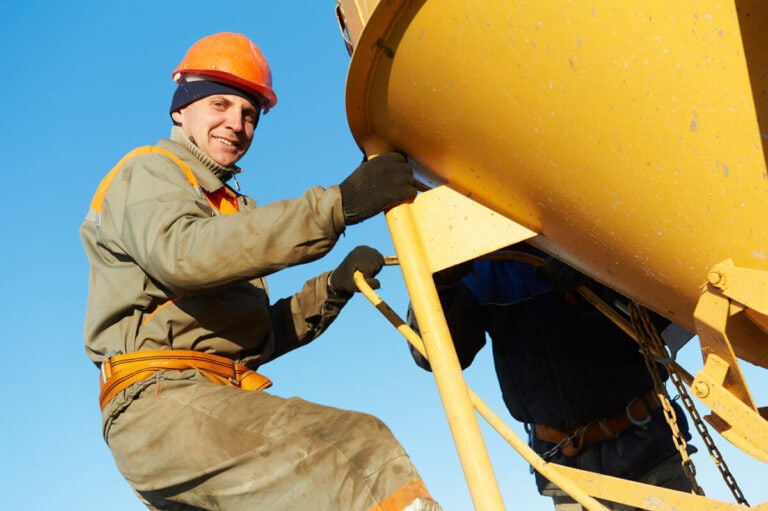In construction, concrete is the most frequently used material. It is used to build roads, floors, walls, and more. Concrete works as the foundation of the houses that we live in, and the buildings that we work in and we use for other commercial and non-commercial purposes. That is why the foundation must be built well from the start, to ensure the safety of the workers and of the people who will live in the house or use the building, and also prevent future extra costs in repairing it. In connection to this, having a good concrete contractor and good employees who will work well and with quality in building these foundations is necessary to survive, thrive, and succeed in the concrete construction field.
What is a concrete contractor?
Concrete contractors are specially trained and experienced people who can handle concrete in its different stages starting from the unmixed combination to the hard-finished foundation. Certified concrete contractors can create intricate plans and designs with their knowledge and experience in the industry. Because of this, homeowners and building owners can choose to have their own customize renovations and design features in their property. Great contractors use their skills, knowledge, techniques, and experiences to create the utmost possible result which can satisfy the clients. In addition to these, concrete specialists can finish their tasks efficiently using their special tools. A professionally trained concrete contractor can deliver projects with the highest quality, with top structural standards and customer satisfaction during the process of creating the project and after it is finished. They also make sure that the expectation of the client regarding the project is met throughout the process, with their reliable and effective service. There was a point in time when concrete contractors themselves prepare the concrete needed for a project. But today, with ready mix plants available in most areas, now, they do not need to do this part of the job by themselves.
What are the jobs and responsibilities of a concrete contractor?
- Details about the concrete
In concrete construction, the first thing that concrete contractors need to do is to identify the shape, size, color, finish, and depth of the concrete that will be used. All of these things should be prioritized before the start of the project for each option can highly change what is needed, and all of these factors can affect the overall result of the project.
- Site Preparation
One of the jobs of concrete contractors is site preparation wherein they backfill and excavate. Through site preparation, contractors ensure that rocks, trees, grass, garbage, and shrubs are thoroughly removed. They make sure that the ground is compacted, graded, and leveled for these are necessary to make sure that it can load the requirements of the building for years even under different weather situations, both extreme and mild. Because when the ground is not correctly prepared to permit and withstand the settling of moisture and dirt, there can be problems with the concrete which can compromise the integrity of the building and the safety of the people who will occupy it.
- Formwork
One of the best characteristics of concrete is its capability of taking many shapes and designs. Formwork is one of the jobs or responsibilities of concrete contractors. Today, there have been several innovations to formwork. An example of this is prefabrication which makes formwork less intensive, less expensive, and less wasteful. To create the shapes and designs that the client prefers, they use formwork to create the mold that is needed for concrete placement and to keep the concrete in place while the mixture hardens. Based on how the concrete will be made use of, the shapes and forms can be set using plastic, metal, or wood.
- Placement
Another part of a concrete contractor’s job is placement. During this part of the process, the concrete is poured into forms and using rakes and shovels the construction team will move the concrete through the forms.
- Finishing
In the finishing process, after the concrete is poured, it is then consolidated and compacted to make sure that air pockets are not present. The finish can be a broom finish, wherein a special broom is pulled over the surface to make a rough texture quality. And whenever necessary, finishing might also include putting decorative elements to the concrete which can include design, dye, or other details.
How can project management software help a contractor?
Being a concrete contractor comes with plenty of different jobs and responsibilities. But by using a construction project management software like Pro Crew Schedule, tasks such as construction crew management will become a lot easier. Task tracking and scheduling projects will also become more efficient with the use of project management software.
Working with concrete means working with phases. Also, every step or phase in the project is crucial, wherein every step affects the whole process and the final output itself. That is why tracking every stage of the project is essential to build an output that matches the preference and idea of the client. By using project management software, the contractor can track the progress of the project with pictures and other data which can be sent and access through the software, anytime and anywhere. With this, it can be ensured that the construction crew is following the project timeline properly. Also, through this, mistakes that can incur unwanted costs in the future can be avoided.
In every project, it is also extremely important that every person in the crew is doing their job on time and they are performing with quality. Through project management software, the person responsible for the construction crew can monitor the progress of each member and easily check if they are doing their job correctly with the use of the photos captured from the site and the documents which can all be delivered and access through the software. With these photos and documents, the manager can also check and confirm if the materials that are bought and use are the right materials that can prevent discrepancies and additional costs.
Another perk of using a project management software is that the person in charge can easily create, arrange, and fix schedules of the project and the construction crew.
How to become a concrete contractor
To become a concrete contractor, here are some of the factors that one needs to consider and meet, although it might vary in some places:
- Education
If one wants to become a concrete contractor, at the minimum, one needs to have a bachelor’s degree in civil engineering or equivalent to it in a related field. Other than this, one should also acquire a concrete license.
- Experience
Another factor that is necessary for one to be a concrete contractor is experience. One might learn all the theories when it comes to concrete construction, but without a sufficient amount of experience with the job that needs to be done, the theories will not be enough. One should experience the procedures and other parts of the job firsthand, in the field and the office. One can undergo training to achieve this.
- Business Plan
To become a concrete contractor, one should first have a business plan. In becoming a concrete contractor, one needs to identify the goals, direction, and strategies that one wants for his/her business. By having a business plan, one can focus on the important matters at hand.
- Equipment
In working as a concrete contractor, especially when working in the commercial field, it is important to have the right equipment. One will need to work with hands-on heavy-duty mixers and other professional tools required for the job. With this, one can opt to buy or to rent the necessary equipment depending on the situation.
- Target
The target market is also an important factor that needs to be considered. In becoming a concrete contractor, one must know where to focus. One can focus on doing residential work which includes pouring walkways and patios or one can prefer focusing on commercial projects which involve public works, schools, and offices. It is important for one to first decide where to focus because the tools, expertise, and skills that are necessary for residential and commercial projects are highly different from one another.
- Suppliers
Having reliable suppliers is also a factor that needs to be considered in becoming a concrete contractor. Frequently, certified concrete contractors create agreements with a supplier who will provide them with pre-mixed concrete. Also, there are various things that one needs to remember when it comes to dealing with supply. Some of these are the weather, drying of the concrete, and scheduling orders.
- Legalities
Another important factor that one needs to consider in becoming a concrete contractor is the legal aspects. One needs to get in touch with a lawyer to discuss the possible options. It will also be necessary to obtain liability, worker’s compensation insurance, and company auto insurance.
Being a concrete contractor is a tough job and it is really hard to find a company that can provide quality services. As a concrete contractor, we need to make sure that we know the scope of our jobs and responsibilities to our client. More than an essential workforce, our dedication and commitment to our project is the key to be successful in the construction business.





